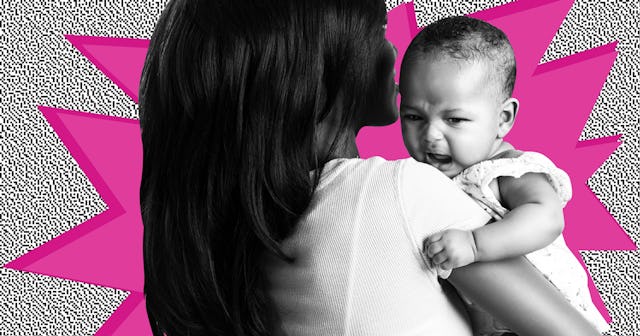Postpartum Euphoria: The Postpartum Mood Disorder Most People Haven't Heard Of

Almost all of us have heard of postpartum depression – after all, 1 in 7 women will experience it. Over the past few years, many of us have learned that postpartum anxiety can be just as common (or even more common) than postpartum depression.
Important awareness is also growing about the rarer but equally serious postpartum mood disorder, postpartum psychosis, which may be characterized by mania, paranoia, delusions, hallucinations, and rapidly changing mood swings – and which requires immediate medical attention.
But there is one lesser known postpartum disorder that is just starting to get attention, and which I have a hunch you likely have never heard of. It’s called postpartum euphoria, but is often referred to as postpartum hypomania, or “the baby pinks.”
Now, using words like “euphoria” or “pink” may lead you to believe that postpartum euphoria is a good thing – and many women who experience it think the same. But it’s not.
Postpartum euphoria is actually a serious postpartum mental health issue that could potentially lead to even more serious issues like postpartum psychosis. The fact that almost no one has heard of the disorder – and that many of its symptoms look like positive behaviors – means that it can be really hard for postpartum moms to get properly diagnosed and treated for it.
Writer Briana Bell, mom of three, described her experience with postpartum euphoria in a recent article in The Huffington Post. Bell shared that she experienced prenatal depression (depression during pregnancy) that was very intense, and which she received treatment for. When her daughter was born, she was happily relieved of her feelings of depression, and instead began to feel a powerful “high.”
“[O]nce we were released from the hospital, when my daughter was 24 hours old, I was flooded with an intense amount of energy,” writes Briana, who recalls moving non-stop, entertaining guests, and even begging her husband to take her on a trip to the mall … when she was less than a week postpartum. “I couldn’t believe how good I felt,” Bell recalled.
But it ended up too good to be true. Bell’s euphoria and boundless energy caused her to crash and pass out while nursing her baby. She was rushed to the emergency room, where she treated with IV fluids. She was told to slow down so that she could rest and recover.
Bell says that although she was thankfully able to take that advice, that boundless energy didn’t really dissipate for another few weeks, and she wasn’t formally diagnosed with postpartum euphoria until several months later when she came across the term postpartum euphoria/hypomania and reached out to her doctor for clarification.
“All these months, I had lived with the guilt and shame of those early postpartum days, but really, I was suffering from a serious mental health issue,” says Bell.
Bell is now on a mission to get the word out about postpartum euphoria so that other moms can be diagnosed sooner and get the treatment they need and deserve. “I share my story of postpartum euphoria because nearly every single person who hears it hasn’t heard of this particular postpartum mood disorder,” says Bell.
So what is postpartum euphoria, and how do you know if you or a loved one might be experiencing it? Here are some facts:
– According to Neuropsychiatry, up to 1 in 10 women experience symptoms of postpartum euphoria (hypomania).
– Women suffering from postpartum euphoria may seem like “Super Moms” – full of energy, able to function on little sleep, and generally elated and hyper.
– Moms may exhibit impulsive behaviors, start speaking quickly, and may experience racing thoughts and an inability to concentrate.
– Clinic Change, a mental health clinic in Canada, states that symptoms usually begin soon after birth and may continue for 6-8 weeks postpartum.
– Causes of postpartum euphoria may include stress, hormone fluctuations, trauma, a history of mental health issues, and lack of support.
– Experts are still learning about postpartum euphoria, but caution that it may be a precursor to postpartum psychosis/postpartum bipolar disorder, a very serious mental illness that can put moms and babies lives in danger.
– Clinic Change recommends that if you notice any of these behaviors in your loved ones, seek medical treatment immediately.
– In some cases, therapy, lifestyle modification, and support are effective enough treatments; in other cases, medication must be combined with these for treatment to work.
I think the biggest takeaway is that postpartum euphoria is actually relatively common (1 in 10 moms is a lot of moms!), but that almost no one knows anything about it. This needs to change as soon as possible.
In general, far too little attention is paid to the struggles of postpartum mothers, and when it comes to health or mental health concerns, the consequences of not paying attention can be grave.
The other striking aspect of this is how easy it is to mistake postpartum euphoria as something entirely positive – totally desirable, in fact. I mean, who doesn’t want to be a “postpartum supermom?”
“In a world that celebrates superheroes, it’s easy to celebrate a postpartum woman vibrant with intense energy instead of seeing this for the warning sign that it is,” writes Bell.
We need to dispel that myth that women are even supposed to be superheroes at all, especially when they’ve just had a freaking baby. But most of all, we all need to be aware of the serious needs postpartum women have, both physically and mentally.
And then we need to care for them with as much detailed attention, expertise, and love as we provide for the babies they bring into the world.
This article was originally published on